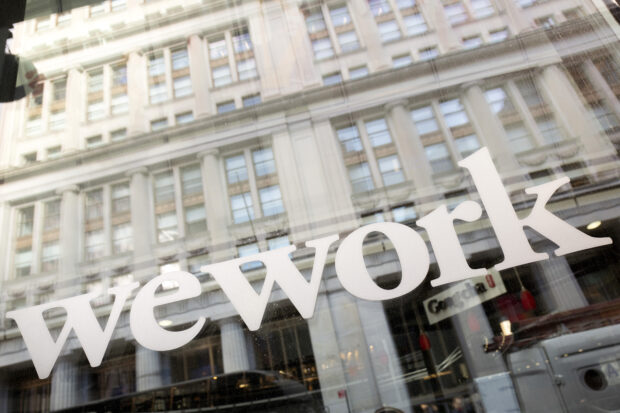Co-working space provider WeWork has emerged from bankruptcy

The WeWork logo is seen at one of the company’s offices, Jan. 16, 2020, in New York. WeWork has officially emerged from bankruptcy — and appointed a new leadership in the process. (AP Photo/Mark Lennihan, File)
NEW YORK — WeWork has officially emerged from bankruptcy. And all eyes are on whether its new leadership can guide the long-embattled provider of co-working office space to success.
Once a Wall Street darling promising to revolutionize the world of work, WeWork took a stunning — but anticipated — fall last November when it filed for Chapter 11 bankruptcy protection.
Early overexpansion shackled WeWork with mounting debt and unsustainable real estate costs, and the New York-based company turned to restructuring in a bid to resurrect its business.
WeWork emerged from the restructuring, which took effect Tuesday after being finalized in court last month, as a private company. That means its future financial disclosures will be limited, but the company says it’s shed more than $4 billion in debt, raised $400 million of additional equity capital, and cut future lease obligations in half — which it expects to bring some $12 billion in future savings.
READ: WeWork, once most valuable U.S. startup, succumbs to bankruptcy
WeWork’s real estate footprint also got smaller. The company exited 170 “unprofitable” locations — bringing its portfolio to about 600 wholly-owned, franchisee, and joint-venture locations in 37 countries. That’s down from around 770 locations across 39 countries reported ahead of November’s Chapter 11 filing.
Uncertainty
“They rejected a great deal (of leases), so it’s obviously going to put WeWork in a much better position in terms of being lean enough … to exit bankruptcy and operate without so much crushing overhead,” said John D. Giampolo, a member partner at New York-based law firm Rosenberg & Estis who specializes in corporate bankruptcy reorganization and represented several landlords and creditors in WeWork’s bankruptcy case.
Still, the future is uncertain. “Is it going to be enough so that WeWork becomes sufficiently profitable long-term?” Giampolo added. “I think only time is going to tell.”
READ: WeWork to lay off 2,400 workers worldwide
The company’s new leadership is also being watched. Corresponding with Tuesday’s announcement about emerging from bankruptcy, WeWork revealed that David Tolley has stepped down as CEO and is being replaced by John Santora, of real estate company Cushman & Wakefield, effective Wednesday.
Santora is the fourth permanent CEO that WeWork has seen over the last five years. His predecessor Tolley, who joined WeWork just last year, became interim CEO in May 2023 — a position that became permanent in October.
In a prepared statement, Santora sounded an optimistic note about the company’s role in the co-working space.
“I firmly believe that flexible work is no longer just an option, but rather a strategic imperative for companies wanting to maximize the efficiency of their real estate footprint, as well as their dynamic workforce,” he stated.
Beyond the new chief executive appointment, WeWork also unveiled a new board of directors. More than half of the new members come from real estate software company Yardi Systems, which agreed to acquire a majority stake in WeWork through its wholly-owned subsidiary Cupar Grimmond during bankruptcy proceedings.
Commercial real estate experts like David Putro, senior vice president at Morningstar Credit Analytics, note that demand for co-working spaces remains strong — and, while WeWork is still the biggest name in the market today, many competitors have popped up over the years. Still, he and others add, that having a sustainable business model and keeping up with consumers’ evolving needs is crucial.
Weak demand for office space
While post-pandemic return-to-office efforts have taken “forever to truly manifest” for many workers, Putro says, demand for co-working spaces should be a sizeable part of that conversation.
Still, WeWork’s reemergence from bankruptcy also arrives at a time when demand for office space remains weak overall. The COVID-19 pandemic led to rising vacancies in commercial real estate — with many Americans still spending at least part of the week working from home. Major U.S. markets struggling to improve office space occupancy include San Francisco, New York, Chicago, and Washington, D.C.
That makes it even harder for landlords who may have lost major tenants, like WeWork, to fill their spaces again.
“We’re still seeing the residual effects,” said Putro, whose team has tracked WeWork locations that have been shuttered or seen leases terminated both before and after the company’s bankruptcy filing. “In some cases, that means (potentially) losing a building.”
WeWork was founded by Adam Neumann and Miguel McKelvey in 2010. In its early years, the startup saw a meteoric rise — once reaching a valuation as high as $47 billion — but over time, WeWork’s operating expenses soared and the company relied on repeated cash infusions from private investors.
WeWork went public in October 2021, after its first attempt to do so two years earlier collapsed spectacularly. That debacle led to the ousting of Neumann, whose erratic behavior and exorbitant spending spooked early investors. During the bankruptcy process, Neumann himself made a bid to buy back the company but eventfully accepted defeat.